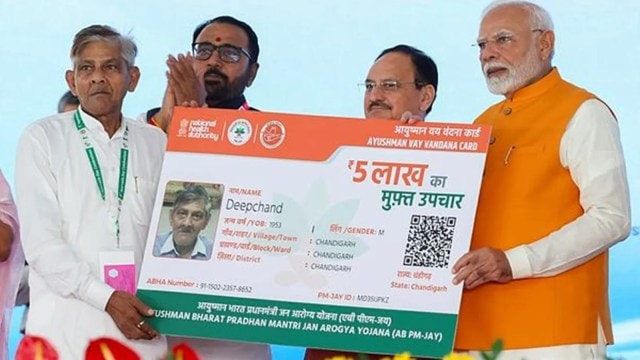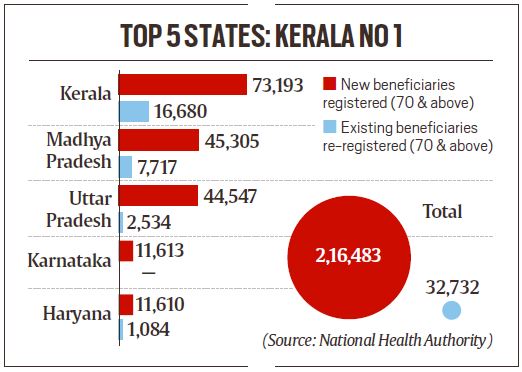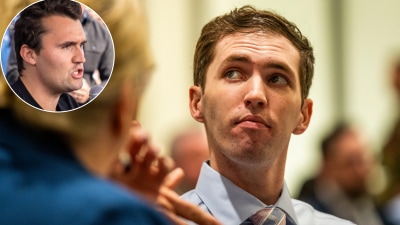The data also shows that 32,000 additional beneficiaries above the age of 70, who were already covered by the original scheme based on income criteria, have re-registered to avail the cover of Rs 5 lakh provided in the extended version with no income limit.

Kerala has registered the highest number of new beneficiaries under the extended version, with nearly 89,800 cards issued for the elderly, according to data available till November 7 with the National Health Authority. The state, incidentally, is among those projected to have the highest proportion of elderly citizens over the next decade, with those over 60 expected to make up 20.9% of its population by 2031.
The next two states on the list of new elderly beneficiaries are Madhya Pradesh and UP with over 53,000 and 47,000 cards, respectively. Census projections for 2031 show that UP is likely to have the largest elderly population among all states by then, with 2.58 crore people over the age of 60, while Madhya Pradesh is listed four rungs below with 1.04 crore.
Registration in the expanded category has been slower in traditionally high-utilisation states like Tamil Nadu (3,156), Telangana (3,056) and Andhra Pradesh (3,488), the data shows.

The numbers do not cover AAP-ruled Delhi and TMC-ruled West Bengal, which opted out of the scheme. Incidentally, during the rollout of the expanded version on October 29, the Prime Minister had expressed regret that elderly citizens in these two states remain excluded.
However, the AAP-ruled government of Punjab has implemented the expanded version with a senior official saying the state has issued 5,697 new cards to the elderly in the past week to rank among the top ten on the list.
Story continues below this ad
The Central Government’s latest initiative aims to benefit approximately 4.5 crore families with 6 crore senior citizens. Under the expanded version, everyone aged 70 or more, irrespective of income, will be entitled to a cover of Rs 5 lakh annually to be shared within the family. This means if there are two elderly beneficiaries in the household, the cover will be split among them.
Elderly members of families that are already covered under Ayushman Bharat in accordance with their economic status will get an exclusive top-up cover of Rs 5 lakh. These elderly beneficiaries will have to re-register to receive the top-up cover.
First launched in 2018, AB-PMJAY is the world’s largest health insurance programme of its kind and has witnessed 6.86 crore hospital admissions. It provides Rs 5 lakh in shared annual coverage to all members of eligible families estimated to comprise the bottom 40% of the population economically.
The expanded version of the scheme, covering all elderly, is still being rolled out in various states. For instance, its implementation is delayed in Jharkhand and Maharashtra where Assembly polls are around the corner.
Story continues below this ad
Officials from Maharashtra confirmed the expansion has not been launched. A Jharkhand official said, “The state has yet to adopt the expanded scheme due to the Model Code of Conduct. Registrations for all those over 70 can begin once the state approves the scheme. The state is yet to estimate the scheme’s financial implications, as the age-wise breakdown of the elderly population is still being analysed.”
In UP, an official said “registrations are high even though full-fledged implementation hasn’t started yet”. “Implementation is pending in ten districts where by-elections are scheduled. There is a lot of pent-up demand here, and people have already started claiming benefits,” the official said.
The official said the state is yet to allocate funds for an estimated 66 lakh additional families that will be covered. “Since it’s part of the existing scheme, we’ll initially cover new beneficiaries using current funds and request additional funds through the supplementary budget,” the official said.
In states like Himachal Pradesh, with just over 1,600 registered beneficiaries, officials said the scheme is still gaining traction. “The portal has opened, and we have done trial registrations. We still need to approve an additional budget. Once approved, we’ll launch publicity campaigns and instruct hospitals to start registrations,” a state official said.
Story continues below this ad
In J&K, where the scheme already has universal coverage, an official said the top-up option would “bring more relief” to the elderly and that the additional financial impact on the administration would be “minimal”.










